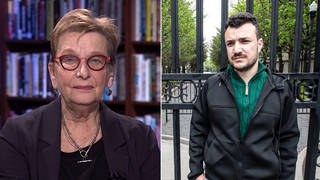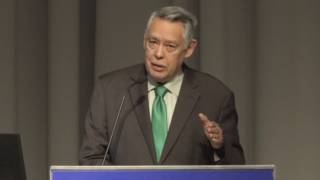
Guests
- Juan Gonzálezaward-winning reporter, Democracy Now! co-host and author of many books, including News for All the People and Harvest of Empire: A History of Latinos in America.
Last week Democracy Now! co-host Juan González penned his final column for the New York Daily News, where he’s worked for 29 years. We play González’s speech from last November, when he was inducted into the Deadline Club’s New York Journalism Hall of Fame, becoming the first Latino journalist to be selected for the honor. González reflected on his career. “I figured my modest contribution would be a voice from another part of New York,” he said. “Not writing about outcast neighborhoods, but from them. Not simply to entertain, but to change. Not after the fact, but before it, when coverage could still make a difference.”
Transcript
AMY GOODMAN: This is Democracy Now!, democracynow.org, The War and Peace Report. I’m Amy Goodman in New York, with Juan González—oh, I’m Amy Goodman in Atlanta, Georgia. Juan González is in New York. But we’re going to turn right now to Juan González. That’s right, Juan has just become the first Latino journalist inducted into the New York Journalism Hall of Fame. He, last week, retired, after 29 years, from the New York Daily News. Over the years, Juan has used his column to break major corruption scandals and cover-ups, including the attempt to conceal the health impacts of the toxic dust released on 9/11 in New York.
In his sign-off, in his final column, Juan wrote, quote, “I opted to become a voice from another part of urban America. Not writing about outcast neighborhoods, but from them. Not simply to entertain, but to change. Not after the fact, but before it, when coverage could still make a difference.”
In November of last year, Juan was inducted, yes, into the Deadline Club’s New York Journalism Hall of Fame, becoming the first Latino journalist to be selected for the honor. He was inducted along with Charlie Rose, New York Times journalist Max Frankel, 60 Minutes correspondent Lesley Stahl, ProPublica founder Paul Steiger and Time magazine journalist and editor Richard Stolley. Juan was introduced by the Deadline Club’s J. Alex Tarquinio.
J. ALEX TARQUINIO: Juan González has been a staff columnist with the New York Daily News since 1987 and co-host of the syndicated radio and television news program Democracy Now! since 1996. I believe there are a few of you here. His books include Harvest of Empire: A History of Latinos in America, News for All the People: The Epic Story of Race and the American Media and Fallout: The Environmental Consequences of the World Trade Center Collapse. González has received two George Polk Awards for Commentary and has been named to the Hall of Fame of the National Association of Hispanic Journalists. Please welcome Juan González.
DEMOCRACY NOW! STAFF: ¡Juan, presente!
JUAN GONZÁLEZ: My thanks to the Deadline Club for this honor. It’s still hard to believe you consider my writing and reporting worthy of being recognized next to the amazing figures you’ve previously inducted into the Hall of Fame and beside this extraordinary group of my fellow nominees this year. Are you sure somebody didn’t make a mistake?
I’m just amazed that I’m still—I still have a job at the Daily News, given all the—all the upheaval brought about in our media industry by the digital age. A few weeks ago, during our last round of heartbreaking layoffs at the News, I was sitting in an editorial board meeting with a bunch of reporters and editors interviewing Governor Cuomo, when my—one of my editors, Rob Moore, who was sitting next to me, suddenly pointed to his smartphone. “The Observer is reporting you’ve been fired,” he told me. I took a deep breath and said to him, “Well, can you confirm that for me?” “You have nothing to worry about,” Rob said. He didn’t add, “For now.”
Well, I was already fired by the Daily News 25 years ago last month. Our owner at the time, the Tribune Company, declared me and 2,500 reporters, ad sellers, pressman, drivers permanently replaced for daring to go out on a labor strike. It took us five long months on picket lines and protests, through a bitterly cold winter, but we eventually won that strike, during which I somehow managed, as chair of the Guild’s strike committee, to earn the respect of all those old-line Irish and Italian reporters at the News who until then had disdained me as some kind of unqualified affirmative action hire. Tribune sold the paper to British billionaire Robert Maxwell, who then proceeded to negotiate a deal with the unions and welcomed us back. So I’ve actually been living on borrowed time for the past 25 years.
As some of you may know, mine has not been the typical journalism career these past 37 years. I’ve managed to work not only in mainstream journalism, but proudly in the alternative and dissident press, most notably for the past 20 years with Democracy Now!, with a terrific journalist and friend, Amy Goodman, who’s here tonight—today, but also at various times in the Spanish-language or ethnic press. In addition, I must be the only reporter in mainstream journalism with an extensive rap sheet, having been arrested about a dozen times over four decades, in the 1960s, '70s, ’80s and ’90s, on a variety of charges: criminal trespass, contempt of court, marijuana possession, inciting to riot, draft evasion—all, except for the marijuana bust, related to political protest. Mike McAlary often joked to me that one day he went into the old Daily News library and came across the paper's clips on my radical days. This was when papers still had massive, dusty files of yellowed, cut-out articles stuffed into pocket folders under various subjects and names. There, Mac found the old stories on me. The clip folder title was “Juan González, revolutionary.” But by then, someone had crossed out “revolutionary” and changed it to ”Daily News columnist.”
So, yes, I had a prior life. And I didn’t really get started into mainstream journalism until I was already in my thirties. That I ended up a reporter at all, you can chalk up to Ms. Bonagura and to the Young Lords. One gave me the skills, and the other gave me the heart.
Pauline Bonagura was the one public school teacher every kid dreams about. She was an English and journalism instructor at Franklin K. Lane High School in East New York, Brooklyn. Young, charismatic, relentless, she had a hopeless love affair with the English language and was determined all her students would master not only grammar and writing, but the art of reporting. The number of fine journalists she produced is remarkable. David Vidal, who for years was a foreign correspondent from the Times; Steve Handelman, who worked for decades at the Toronto Star; Carole Carmichael, who was an editor at The Seattle Times; Janet McMillan, a reporter at The Philadelphia Inquirer for many years—all of us were Bonagura’s students. She plucked me, a shy kid from a working-class Puerto Rican family in the Cypress Hills projects of East New York, and chose me to be the editor of her paper, the Lane Reporter, the paper that almost every year won the Columbia Scholastic journalism prize. And that probably had a lot to do with my eventually getting into Columbia on a full scholarship. And it was there that I first became acquainted with dissident views and social protests, and ended up in SDS in the Columbia student strike of 1968.
Then came the Young Lords. Jimmy Breslin once wrote that the Lords produced more good journalism—journalists than Columbia J School. The Lords were a loud, brash, radical and talented group of Puerto Ricans. We became a thorn in the side of the establishment and the police in this town, and in cities throughout the East Coast for a brief time, and influenced a generation of young Latinos to demand more equitable treatment for our community. But of all the radical groups of the '60s—and there were many back then—we probably received the most sympathetic press coverage. Even as youngsters, we understood the power of the press, and we consciously cultivated good coverage. We were helped by the first brilliant crop of young black and Latino reporters in the city's media, to whom we fed exclusives and who in turn repaid us with more all-around and sound coverage—people like a young Ed Bradley at WCBS, Gil Noble at WABC, Gloria Rojas at WNBC, Rudy Garcia at the Daily News, and of course liberal white writers like Jack Newfield at The Village Voice. And we published our own newspaper, Palante, that I edited for a while. So it was no accident that when the Lords fell apart in the mid-1970s, several of us ended up going into journalism—Pablo Guzmán, Felipe Luciano, Geraldo Rivera, our first lawyer—everybody knows Geraldo—and myself, or that when we landed there, we were all drawn to uncovering injustices and digging deeper than some journalists were accustomed to.
My first job at the Philadelphia Daily News in 1978, I became friendly with Pete Dexter, one of the paper’s big-name columnists. “So what’s it like to write a column?” I asked Pete one day. “It sure beats working for a living,” he told me. I quickly became hooked on the idea of becoming a columnist.
And so, what I’ve been doing the last 27 years or so—I think 27, 28 years now at the Daily News. Well, I had to figure out what I wanted to do as a columnist when I came here. And I decided that in a city brimming with extraordinary veteran newspaper columnists—Jimmy Breslin, Murray Kempton, Pete Hamill, Russell Baker, Sydney Schanberg—and awash with so many able young writers, I figured my modest contribution would be a voice from another part of New York. Not writing about outcast neighborhoods, but from them. Not simply to entertain, but to change. Not after the fact, but before it, when coverage could still make a difference. In daily newspaper writing, time becomes both an enemy and an ally. What you lose in the chance to chisel and refine for the relative few, you gain in the opportunity to influence and energize the many.
I have tried to use as many of my columns as possible to probe the injustices visited upon the powerless. Yes, the rich and the famous are also victims on occasion. But they have so many politicians, lobbyists, lawyers, gossip columnists, even editorial writers, ready to jump to their defense, that they will always do fine without my help. I prefer the desperate, unknown reader who comes to me because he or she has gone everywhere else and no one will listen. More often than not, I come across unexpected gems, human beings whose tragedies illuminate the landscape and whose courage hopefully inspires the reader to believe that there is indeed some greater good served by a free press than just chronicling or influencing the oustering of one group of politicians by another.
So, by giving me this award—and the first Latino journalist, I think, to be so honored by the Deadline Club—I assume you have looked beyond my rap sheet, beyond my rabble-rousing days, and determined that I did indeed add something of value to this great city, while not working for a living all these years. Thank you.
AMY GOODMAN: Juan González in November, speaking at Sardi’s in New York when he became the first Latino journalist inducted into the Deadline Club’s New York Journalism Hall of Fame. When we come back, Tom Robbins and Juan—well, we’ll all reflect on Juan’s 29-year career as a columnist at the New York Daily News. Stay with us.












Media Options